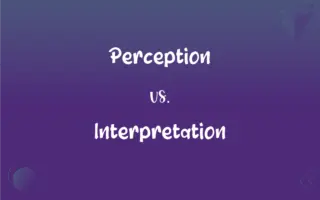Variance vs. Variation: What's the Difference?
Edited by Aimie Carlson || By Harlon Moss || Updated on November 3, 2023
Variance quantifies the spread of a data set; variation refers to the differences within a group or over time.

Key Differences
Variance is a statistical measure that represents the degree to which data points in a set are spread out. It indicates how much the individual data points differ from the mean of the set. Variation, however, is a broader term that refers to the presence of differences or changes in condition, form, or character in a population or between multiple entities or situations.
The term variance is often used in a specific statistical or probability context. It is a calculated value that informs one about the variability of a dataset. In contrast, variation can be observed in many contexts, such as biological differences among species, variations in climate patterns, or the variety in a product line.
Variance is usually expressed as a square of the unit of the data points to avoid negative values that arise from squaring the differences from the mean. On the other hand, variation is not necessarily quantified and can be qualitative, referring to any change or difference that is noticeable without necessarily measuring it.
While variance is a technical term with a precise definition in statistics, variation is used more generally in everyday language. You would discuss the variance among test scores in a scientific study, but talk about variation in musical styles when discussing different genres.
Variance implies a comparison against a standard – the mean – and is a measure of dispersion. Variation is a more general concept that refers to any deviation from the norm or standard, whether measured or observed, and does not necessarily relate to a mean or average.
ADVERTISEMENT
Comparison Chart
Definition
Statistical measure of data dispersion
General differences or deviations
Usage
Mostly in mathematics and statistics
Broadly used across disciplines
Measurement
Quantitative (e.g., variance of height)
Can be quantitative or qualitative
Context
Describes variability from an average
Describes diversity or change
Grammatical Form
Typically a noun
Can be a noun or verb (to vary)
ADVERTISEMENT
Variance and Variation Definitions
Variance
A disagreement or dispute.
The board members are at variance regarding the new policy.
Variation
The occurrence of an organism in more than one distinct color or form.
Genetic variation within the species can lead to different colorations.
Variance
A measure of how much values in a data set differ from the mean.
The variance in the data indicates high variability among the samples.
Variation
A different form or version of something.
She played a beautiful variation of the original piano piece.
Variance
A difference between what is expected and what is occurring.
There's a variance in the budget figures that must be addressed.
Variation
A change or difference in condition, form, or character.
The variation in colors of the leaves is due to the change in seasons.
Variance
A legal authorization to do something different from the usual rules.
They obtained a variance to build an extension to their home.
Variation
A modification in a melody or theme in music.
The composer introduced a variation that gave the piece a whole new feeling.
Variance
In accounting, the difference between actual and budgeted figures.
The finance department is analyzing the expense variance from last quarter.
Variation
Fluctuation in data, phenomena, or behavior.
Daily temperature variation is more pronounced in desert regions.
Variance
The state or quality of being variant or variable; variation
Considerable variance in temperature across the region.
Variation
The act, fact, or process of varying.
Variation
The extent or degree to which something varies
A variation of ten pounds in weight.
FAQs
Can variation occur in non-numerical data?
Yes, variation can refer to differences in non-numeric characteristics like color or shape.
What exactly is variance in statistics?
Variance measures how far each number in a set is from the mean.
Is variance used outside of statistics?
Variance is mostly a statistical term but can be used metaphorically in other contexts.
What causes variation in a species?
Genetic differences and environmental factors can cause variation within a species.
Are cultural differences a form of variation?
Yes, cultural differences are considered a form of social variation.
Is variation always visible?
Variation can be visible or may require measurement to identify, depending on the context.
Do language variations count as variation?
Yes, differences in dialect or usage within a language are types of variation.
Does variation imply evolution?
Biological variation is one of the factors that can drive evolutionary processes.
What does zero variance mean?
Zero variance means there is no variability and all values are identical.
How is variance different from standard deviation?
Variance is the squared average of the deviations, while standard deviation is the square root of the variance.
Can variance be negative?
No, variance is always non-negative because it is derived from squared values.
What is the importance of variance in research?
Variance helps researchers understand how much dispersion exists within their data.
Is variance a measure of risk in finance?
Yes, variance is used to quantify the volatility of an investment's returns.
Can variance help predict outcomes?
Variance is used in predictive models to estimate the reliability of predictions.
Is variation the same as diversity?
Variation is a component of diversity, which includes a range of differences.
Can variation be controlled?
Certain types of variation, like manufacturing variations, can be controlled to some extent.
How is variance calculated?
Variance is calculated by averaging the squared differences from the mean.
How is variation beneficial to an ecosystem?
Variation can increase an ecosystem's resilience to environmental changes.
Can variance be used in quality control?
Yes, variance is a key metric in statistical quality control processes.
Are variations in weather predictable?
Weather variations can be somewhat predicted using models and historical data.
About Author
Written by
Harlon MossHarlon is a seasoned quality moderator and accomplished content writer for Difference Wiki. An alumnus of the prestigious University of California, he earned his degree in Computer Science. Leveraging his academic background, Harlon brings a meticulous and informed perspective to his work, ensuring content accuracy and excellence.
Edited by
Aimie CarlsonAimie Carlson, holding a master's degree in English literature, is a fervent English language enthusiast. She lends her writing talents to Difference Wiki, a prominent website that specializes in comparisons, offering readers insightful analyses that both captivate and inform.































































